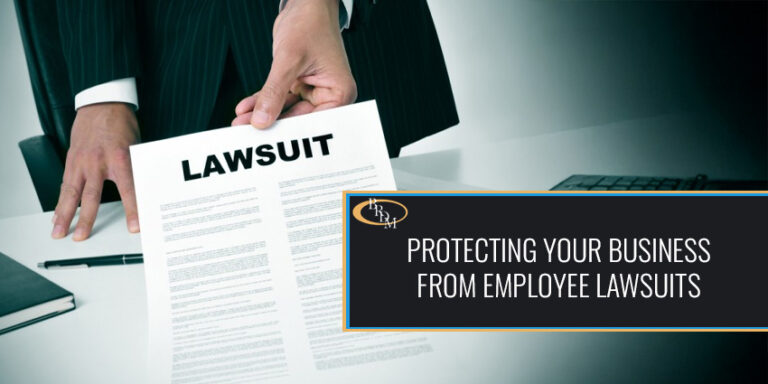As Florida business attorneys with decades of experience, we’ve seen how quickly an employee lawsuit can disrupt even the best-run company. It only takes one dispute to trigger costly litigation, drain resources, and harm your reputation.
But with the right precautions in place, you can reduce your risk—and focus on growing your business with confidence.
In this guide, we’ll walk you through the most common types of employee lawsuits, preventive steps you can take, and how a trusted Florida business attorney can make all the difference.
Table of Contents
- Understanding Employee Lawsuits
- Implement Clear Employment Policies
- Provide Regular Employee Training
- Maintain Accurate Employee Records
- Use Fair and Transparent Hiring and Firing Processes
- Consider Employment Practices Liability Insurance (EPLI)
- Foster a Culture of Compliance and Communication
- Conduct Regular Internal Audits
- Use Legal Agreements When Necessary
- What to Do If You’re Already Facing a Lawsuit
- Why Expert Guidance from a Florida Business Attorney Matters
- Contact Battaglia, Ross, Dicus & McQuaid, P.A. for a Free Consultation
Understanding Employee Lawsuits
Employee lawsuits can arise from a wide range of workplace issues. Some stem from unintentional errors or misunderstandings, while others result from more serious compliance failures.
The most common types of employee claims include:
- Discrimination – Claims based on race, gender, religion, age, disability, or other protected characteristics.
- Harassment – Allegations of inappropriate conduct or hostile work environments.
- Wrongful Termination – Firing an employee in violation of employment laws, contracts, or public policy.
- Retaliation – Punishing an employee for reporting violations or participating in investigations.
- Wage and Hour Disputes – Issues involving unpaid wages, overtime, or employee misclassification.
Each of these claims can lead to investigations, legal fees, and damage to your brand—even if the claims aren’t valid.
Implement Clear Employment Policies
First, a solid foundation begins with clear, legally compliant employment policies. These policies help prevent issues before they arise and show that your business takes compliance seriously.
Your employee handbook should include:
- Anti-Discrimination and Harassment Policies – Outline what behaviors are unacceptable and how employees can report problems.
- Disciplinary Procedures – Explain how violations will be handled and what employees can expect.
- Wage and Hour Policies – Clarify timekeeping, breaks, overtime, and payment schedules.
- Social Media and Privacy Guidelines – Define expectations regarding online conduct and confidentiality.
Make sure to regularly review and update your policies to stay in line with Florida and federal laws.
Provide Regular Employee Training
Even the best-written policy won’t protect your business if no one follows it. That’s where training comes in.
At a minimum, schedule regular training sessions on:
- Workplace Conduct and Ethics – Reinforce the importance of respectful and inclusive behavior.
- Compliance with Labor Laws – Educate staff and managers about wage, hour, and safety regulations.
- Anti-Harassment Protocols – Make sure everyone understands what constitutes harassment and how to report it.
Not only does this foster a better work environment, but it also creates a record showing your business is proactive in preventing misconduct.
Maintain Accurate Employee Records
Proper documentation can make or break your case if you ever face a lawsuit.
Keep clear records of:
- Employee Performance Reviews – Regular evaluations help justify promotions, raises, or disciplinary actions.
- Disciplinary Actions – Document violations, warnings, and resolutions in detail.
- Training Attendance – Track who attended each session and what was covered.
Accurate records help your Florida business attorney provide a legal defense and show that you treated employees fairly and consistently.
Use Fair and Transparent Hiring and Firing Processes
Hiring and firing are among the most legally sensitive areas for any employer. Mistakes here often lead to claims.
Best practices include:
- Creating Clear Job Descriptions – List essential duties, qualifications, and expectations.
- Using Consistent Interview Questions – Avoid asking anything that could be interpreted as discriminatory.
- Following Documented Termination Procedures – Always explain the reason for dismissal and retain proof of performance issues when applicable.
Even when letting someone go, treat them with dignity and professionalism. It goes a long way in avoiding disputes.
Consider Employment Practices Liability Insurance (EPLI)
Sometimes, even when you do everything right, lawsuits happen. Employment Practices Liability Insurance (EPLI) provides a financial safety net.
This insurance typically covers:
- Legal fees and court costs
- Settlements and judgments
- Certain employee-related claims (e.g., wrongful termination, harassment)
Although it doesn’t prevent lawsuits, it helps your business survive them. Learn more about EPLI coverage here.
Foster a Culture of Compliance and Communication
One of the most powerful ways to protect your business from employee lawsuits is to build a culture of trust, transparency, and accountability. When employees feel respected and heard, they’re less likely to take legal action—and more likely to stay engaged and loyal.
At Battaglia, Ross, Dicus & McQuaid, P.A., our Florida business attorneys have seen firsthand how proactive communication can prevent legal disputes before they begin.
Why Company Culture Matters
Courts often look at how a company handles internal concerns. If you’ve fostered a healthy work environment with clear procedures for addressing complaints, it shows good faith—even if something does go wrong.
Here’s how to create a workplace culture that supports legal compliance and employee satisfaction:
1. Train Your Managers Thoroughly
Your leadership team sets the tone. Ensure all managers are trained on employment laws, company policies, and how to respond to issues like harassment, discrimination, and wage disputes. When managers know the rules, they’re less likely to violate them—and more likely to catch problems early.
2. Encourage Open Communication
Employees should feel safe raising concerns without fear of retaliation. Make it clear that you welcome feedback and are committed to resolving workplace issues quickly and fairly.
- Open-Door Policy: Let employees know they can come to you or HR at any time.
- Anonymous Reporting Tools: Offer hotlines or digital forms for private submissions.
- Exit Interviews: Use these to gather honest feedback and identify systemic issues.
3. Respond Quickly to Complaints
Don’t ignore warning signs. Investigate any complaint—no matter how small—with seriousness and objectivity. Document each step, including interviews, findings, and outcomes. This paper trail can become critical if the issue ever escalates.
4. Lead by Example
Workplace culture starts at the top. Owners and executives should model fairness, accountability, and respect in every interaction. When leadership consistently follows policies, others will too.
5. Keep Conversations Flowing
Regular one-on-one check-ins give employees a chance to share concerns before they turn into formal complaints. These meetings also build trust and open lines of communication.
Conduct Regular Internal Audits
Audits help uncover risks before they become liabilities. They also demonstrate due diligence if you’re ever investigated.
Focus your audits on:
- Wage and Hour Compliance – Ensure proper classification of exempt and non-exempt workers.
- Benefits Administration – Confirm health insurance and leave policies comply with legal standards.
- Safety and OSHA Compliance – Address workplace hazards and ensure safety protocols are followed.
Document your audits and take corrective action quickly if you identify issues.
Use Legal Agreements When Necessary
Contracts can help manage expectations and limit legal exposure. Some examples include:
- Employment Contracts – Outline terms clearly for executive or long-term employees.
- Non-Disclosure Agreements (NDAs) – Protect your proprietary information.
- Non-Compete Agreements – Set clear limitations (where enforceable) on post-employment competition that follow Florida’s regulations.
However, these agreements must comply with Florida law. A Florida business attorney can draft enforceable documents tailored to your needs.
What to Do If You’re Already Facing a Lawsuit
Even the most careful business owners can find themselves served with a lawsuit. If you’re already facing one, don’t panic—but don’t delay either. Acting quickly can help protect your business and reduce long-term risks.
Step 1: Contact a Florida Business Attorney Immediately
Time is critical. You’ll need to respond to the lawsuit within a specific deadline, which can be as short as 20 days. Failing to respond could result in a default judgment against your business.
An experienced attorney will:
- Review the complaint and explain the claims
- Draft and file a proper legal response
- Help you understand your options for settlement or defense
- Represent you in court, if necessary
Step 2: Preserve All Relevant Documents
Don’t throw anything away. Gather and secure any records that relate to the lawsuit—emails, contracts, employee files, and even text messages. This is known as a “litigation hold,” and it ensures you don’t accidentally destroy evidence that could help your case.
Step 3: Limit Internal Discussions
It’s natural to want to talk to your team about what happened. But be cautious. Limit conversations about the lawsuit to your Florida business attorney and any staff members directly involved. Anything said or written could be used in court.
Step 4: Stay Professional
Avoid venting on social media or responding emotionally. Judges and opposing counsel can use public statements against you. Keep your communications professional and focused on facts.
Step 5: Explore Settlement Options
Not all lawsuits need to go to trial. Your Florida business attorney may recommend negotiating a settlement. This can save you time, money, and stress. A strong legal team knows how to evaluate the risks and benefits of settling vs. fighting.
Why Expert Guidance from a Florida Business Attorney Matters
Let’s face it: Employment law is complex. Mistakes can be costly, and Google won’t give you legal protection.
Partnering with a Florida business attorney gives you:
- Proactive Legal Risk Assessments – We help identify potential liabilities before they turn into lawsuits.
- Custom Employee Handbooks – Our Florida business attorneys tailor policies to your business, industry, and workforce.
- On-Demand Legal Advice – Whether you’re hiring, firing, or handling a complaint, we’re here to guide you.
- Defense Against Claims – If an employee sues, we’ll represent you and work toward the best resolution.
- Contract Review and Drafting – Make sure your employment contracts, NDAs, and policies are enforceable.
We don’t just offer legal advice—we offer peace of mind.
When you work with Battaglia, Ross, Dicus & McQuaid, P.A., you gain a long-term legal partner who understands your business goals and helps protect what you’ve built.
Contact Battaglia, Ross, Dicus & McQuaid, P.A. for a Free Consultation
Running a business in Florida comes with enough challenges—navigating complex employment laws shouldn’t be one of them. At Battaglia, Ross, Dicus & McQuaid, P.A., our Florida business attorneys have been trusted advisors to companies of all sizes since 1958. Whether you’re launching a new venture or managing a growing workforce, we’re here to help you operate with confidence and avoid legal pitfalls.
We’ve guided businesses across St. Petersburg, Tampa Bay, and beyond through everything from employee disputes to compliance audits. Our team doesn’t offer one-size-fits-all solutions—we tailor our advice to fit your goals and risks.
Why Florida business owners trust us:
- Over 65 years of proven legal excellence
- AV-rated, award-winning Florida business attorneys
- Comprehensive business law services under one roof
- Prompt, personal service when you need it most
- Strategic guidance to prevent problems before they start
If you’re ready to protect your company and focus on what you do best, let’s talk. Schedule your free consultation today—we’ll help you build your business on a strong legal foundation.



